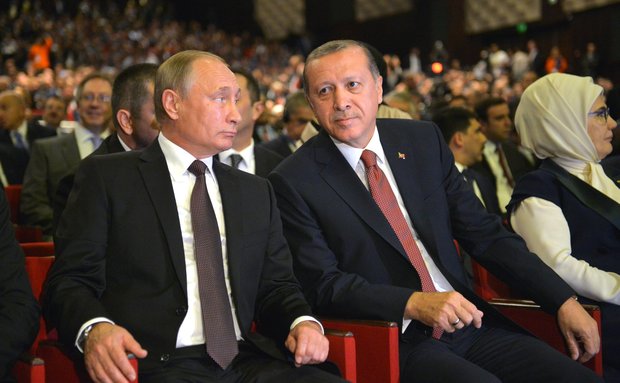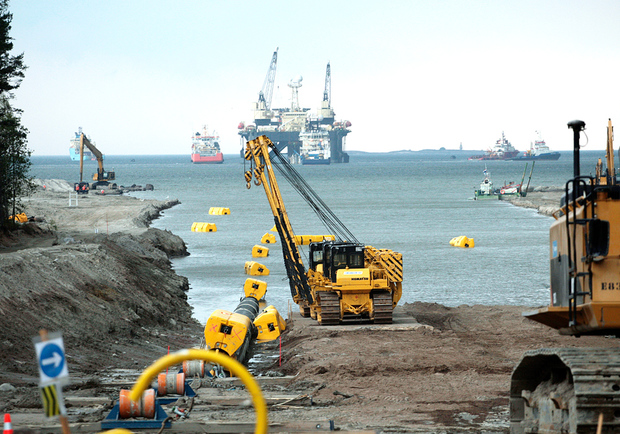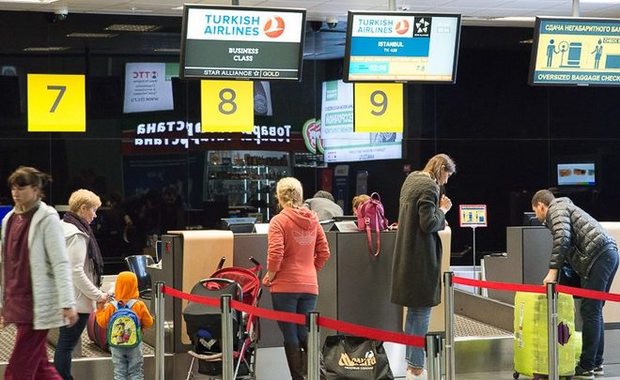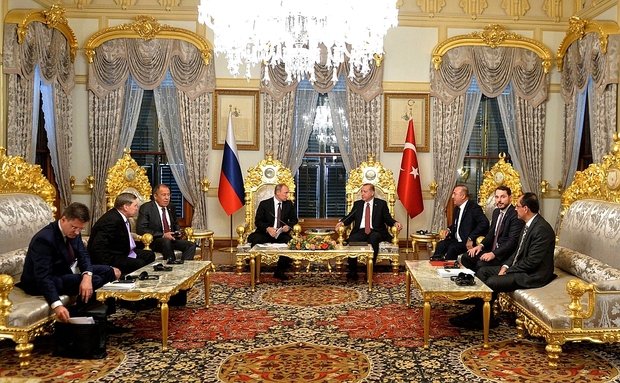Gumer Isaev: ‘Putin and Erdogan need each other’
What will the presidents of Russia and Turkey agree on in Istanbul?
The President of Russia Vladimir Putin arrived in Istanbul on 10 October. In addition to participation in the Energy Forum, he met with the head of Turkey Recep Tayyip Erdoğan. It is the second personal meeting of the presidents of the two countries after a thaw in relations after the incident with Su-24. What will they agree on, what are the aims of the two parties? A famous political scientists and an Orientalist Gumer Isaev told about this in the interview with Realnoe Vremya.
Syria is on agenda
To begin with, could you tell us about the Energy Forum?
We know that there are a large number of energetic events held in the world, because the issue is urgent, especially in the context of such difficult situations with changes in hydrocarbon prices. If we look at how much various events related to OPEC and not associated with that organization directly are carried out during a year, we can see that the topic is urgent, and the represented states are significant from the point of view of consumption, production and transit of hydrocarbons. Therefore, Turkey is a country that wants to become an energy hub, so it acts as the initiator of the event. The visit of the Russian President is a very important moment for the significance of this forum. Its importance is determined by participation of high-ranking officials. The working events are often held at the level of the energy ministers of different countries. Perhaps, Putin has the dual task — to meet with Erdogan. Maduro, coming to the event, as the representative of such important state in Latin America (Venezuela), also pursues his own political objectives.
What will be the main topic at the negotiations of Putin and Erdogan?
I think there will be a number of topics. It can be expected that in the first place there will be issues assosiated with the economy. Over the past decades, despite some incidents, the economy has been a locomotive that pulled the Russian-Turkish relations. Since it is about energy, we can expect some more concrete statements on the Turkish Stream. What we have heard before is only intentions. I am sure that the Turkish side will raise the question about discounts for BOTAŞ, the Turkish state oil company. Probably, in the framework of bilateral meetings they will raise the issue of construction of the Akkuyu Nuclear Power Plant. This is the set that has been before. If to prioritize, the first issue is connected with energy industry in its various forms. Besides, the Turkish side is interested in making life easier for their businesses. For example, the issue on liberalization of the visa regime. As far as I know, it has been resolved not in Turkey's favor, despite the fact that some liberalization has been defined. Russia has already launched charter flights, now the Turks will be interested to do something.

'I think, there will be a number of topics. It can be expected that in the first place there will be the issues connected with economy. Over the past decades, despite some incidents, the economy has been a locomotive that pulled the Russian-Turkish relations.' Photo: kremlin.ru
If to speak about the second point after the economy, it is policy. The Syrian issue is the most painful in the context of international relations. We know that the resolutions of the UN Security Council have recently been blocked. The position of Turkey is really important for Russia, the position of Russia is important for Turkey. I think, there is some coordination of the two countries, their approaches on Syria. This issue has been discussed, is being discussed, but not publicly. Despite the fact that they have discussed things related to the economy, but the Syrian issue in Russian-Turkish relations has been the main political issue for discussion on the agenda, and will remain, no matter what the diplomats and the press service would tell.
As for Syria. What will be the position of Moscow on the Kurds?
The Kurds issue is not so simple in general. For some reason it is considered that Russia is influencing the Kurds issue in Syria or Iraq. I think it is slightly exaggerated. The priority for Russia in Syria now is the support of Assad. Assad guarantees the presence of Russian military facilities on their territory. Russia, in its turn, is trying to save Assad in the civil conflict in Syria. It is unlikely that Russia has resources to influence the Kurds significantly. This question is much more interesting in the context of Turkish-American relations. The Americans do carry out very serious work on the Kurds, which they have been conducting for many years. I think that it is more important to discuss the Kurdish subject matter for the United States and Turkey. Russia can say something, but again, Russia's influence on the Kurds, whether in Syria or Iraq, is exaggerated.
Will they discuss the issue of preventing clashes between Syrian government forces supported by Russia and the Turkish military?
Of course, the question of avoiding any tragic incidents, which could hurt the Russian or the Turkish military, occupies an important place in political discussions between the two leaders. Of course, Turkey has its own purpose in Syria, it wants its buffer zone on part of the territory. Apparently, Russia is satisfied with that. But again, we should proceed from the rhetoric that the Russian Foreign Ministry or representatives of the President of the Russian Federation permit. Proceeding from these statements, positive, neutral or negative, we can roughly understand what is the attitude of Russia to the actions of Turkey. In general, the Turkish operation has not caused a sharp negative attitude in the Russian media. Accordingly, I can assume, and some analysts have said about that Russia and Turkey began to coordinate their actions. If it is not about coordination, but at least they make each other aware and they designate their interests in the region of Syria. The country is large, it is split. I have already told before about the distribution of spheres of influence in Syria, as it occurred in disintegrating states, like Yugoslavia, for example. In the end, maybe Turkey and Russia may have agreed on something during Erdogan's visit to St. Petersburg. And now they conduct these negotiations, given that the representatives of law enforcement agencies also meet. Surely, they discuss tactical issues, to avoid such stories like that happened to the Russian bomber.

'We should proceed from the fact that a buyer and a seller depend on each other: Turkey needs gas and Russia – money for that. Turkey is quite significant buyer of Russian gas – the second after Germany.' Photo: investtalk.ru
From gas pipeline to Nuclear Power Plant
For whom the Turkish Stream is more beneficial? Will they reconsider the terms of pipeline construction at the meeting of the presidents? How dependent is Turkey on Russian gas?
Indeed, Turkey is dependent on Russian gas. On the other hand, Russia also depends on Turkey as an important buyer of its gas. We should proceed from the fact that a buyer and a seller depend on each other: Turkey needs gas and Russia – money for that. Turkey is quite significant buyer of Russian gas – the second after Germany. The possibility of uninterrupted supplies to Turkey in large volume is important for Russia, because Turkey claims that its gas consumption will grow in the coming decades, so its needs are rising. On the other hand, Turkey has alternatives: Azerbaijani gas, the project TANAP and long-term relations with Iran, Qatari liquefied natural gas, and even American liquefied natural gas, which already go to Turkey. So, I would not say that Turkey has no options. Although it is clear, that in the coming years Russia will be the main supplier of 'blue fuel' to Turkey.
As for the Turkish Stream, the question is in its volumes. Initially, the idea was that it would be transit, one line will go to Turkey and one — to Europe through Greece. It is a kind of an alternative route in case of difficult relations with the European Union and Ukraine. But now, I think the most important question: how many lines will be there? Maybe there will be one line or two exclusively in the form of the extension of Blue Stream. Turkey will just get gas itself, and that's enough. But, it is, of course, a matter of discussion not only for Russia and Turkey, but also Russia and Greece. There is a struggle between some forces in Europe. Some of them want to limit Russia's influence in the EU significantly through the gas factor. In this context, the position of Turkey should also be considered, which wants to draw maximum benefit from Russia and from the European Union, and they will act pragmatically. This game on the oil and gas market is certainly interesting. So, we see how the Turkish Stream now occurs in the media, then calms down. It appeared suddenly, after the construction of South Stream turned out to be impossible. Here we need to wait for the statements of Putin and Erdogan on Turkish Stream.
Will there be new steps in the construction of the Akkuyu Nuclear Power Plant?
I must say that this is a unique project, Russia is building at its own money on the Turkish territory. Then Turkey will sell nuclear electricity produced by that power plant. It is a kind of new form of construction and sale. In Iran the construction of Bushehr is carried out on its money and Iran uses it, Russia only maintains and receives money for the service. In Turkey, the plan was different: such expensive project is built by Russia, and Turkey, in its turn, buys electricity from this station. So the question is how realistic this project in the context of the current prices for hydrocarbons, the difficult relations between the two countries. If you look at how Bushehr was built, Akkuyu also can become a long-delayed construction, which depends on different factors. After Fukushima, attitude toward nuclear power stations in the world was ambiguous, there was a wave of negativity. So, of course, it is important for Russia to have such object, to build something, to use and to make money from it, here Russia is interested in it. The question is how real this interest of Turkey because the Middle East area is seismically active. Although they say that in the part where Akkuyu will be built everything is fine, the issue is complicated.
How has the crisis hit the tourism industry? Is there any chance that next year the flow of tourists will return to a pre-crisis level?
I think there is. Especially the ban on charters has been lifted. If we are talking not about the restoration of the stream in its original form, then at least about its growth. If there are be no problems of economic and political nature, next year Turkey will be the leading travel destination because there are not so many alternatives. It is clear that there is also Egypt, but it is another destination — of late autumn, spring or winter. But Turkey, it is of summer and early fall. The weather is not so hot like in Egypt. Turkey will regain its position if the Erdogan regime will be able to keep their country in a stable position. Frequent terrorist attacks, the tense situation in some regions of Turkey — all these factors can have a negative impact on the tourism industry. This is not only a question of bilateral relations. People want to go to a safe place. On TV almost every day people see terrorist attacks in big cities of Turkey. Of course, it does not contribute to increasing of the tourists flow.

'If there are no problems of economic and political nature, next year Turkey will be the leading travel destination because there are not so many alternatives.' Photo: Maksim Platonov
Mr Isaev, as a Russian scientist working in Istanbul, have you felt the cooling and thaw of relations between Moscow and Ankara?
Thank God, I have not felt any aggression in Turkey, despite the fact that the media had quite critical materials devoted to Russian policy in Syria. On the contrary, I've heard many stories on discriminatory actions against Turkish citizens in Russia. Personally I had a rather embarrassing situation on arrival, when for one–two hours the Turkish citizens who came as tourists were not allowed — they were sent back. I could not understand why ordinary people suffer from political squabbles at the top. At the same time, thank God, the Turkish border for me, as a citizen of Russia, during the period of strained relations did not pose any problems. No political circumstances should turn people into villains. I have seen unpleasant situations when in mixed families one person (a mother with the Russian passport) was allowed in Russia, the father with children were not allowed. It's a wild unpresentable presentation of our country in a very bad light. There should not be such things. Whatever it is, people should be people.
Nothing personal, it is just business
What lessons have the elites of the two countries drawn from the political crisis? Who needs whom more: Putin needs Erdogan or Erdogan needs Putin?
They both need each other. In general, charismatic, strong-willed and controlling political space leaders such as Putin and Erdogan are close to each other. Those people, who have a positive attitude to Erdogan as a politician with their specific management, with its strategy of solving the problem, they also treat Putin very well. In the context of comparison of political systems, the Russian and Turkish systems, in my opinion, are very similar in many points, however, there are differences, of course. In a political culture, everything roots in the past — to the era of Imperial transformations. But political culture is more focused on the leader — father of the nation, which stands at the head of a complex political hierarchy. Putin and Erdogan correspond to this transformed image. Anyway, we can talk about similarities. On the other hand, both countries depend on each other economically in the context of the gas agreements. Turkey needs gas, Russia needs money. Agricultural factor also takes place: Turkey buys Russian grain, Russia buys Turkish tomatoes or lemons. The next point – relations in a number of urgent areas: the Caucasus (Karabakh), Syrian issue and subjects related to the Balkans, Cyprus — north and south parts. Russia and Turkey have many points on which they have different points of view. It is very important to find a form of interaction in this part of Eurasia. Nobody is the winner in this crisis of relations. Russia turned out to be in a difficult situation, as well as Turkey, of course.
Economically it did not give any benefit. The more reasons for hatred between peoples, the worse it is. Again, there are different political interests, the objectives of politicians, and politicians are trying to manipulate public opinion, trying to misrepresent their thoughts as opinion of people. But the relationship should reach a fundamentally new level when not the politicians affect public opinion but public opinion affects politicians and forms naturally, but not through the brainwashing in the media. It is also a separate issue that stands between Russia and Turkey.

'They both need each other. In general, charismatic, strong-willed and controlling political space leaders such as Putin and Erdogan are close to each other. Those people, who have a positive attitude to Erdogan as a politician with their specific management, with its strategy of solving the problem, they also treat Putin very well.' Photo: kremlin.ru
Is there a feeling that Putin looks at Erdogan and his assurances with some caution?
I don't think so. The main question that every second Russian asks himself: why the Russian-Turkish relations have normalized so fast? The Russian media carefully created from Turkey an enemy after the incident with the bomber. I do not justify the Turkish side in any way, and the responsibility lies entirely on the Turkish establishment for the incident. It should be noted that a go-ahead was given and all the media rushed to blacken an image of Turkey as a state, place to stay, along with the image of the Turks in general. Some TV channels did openly ethically unacceptable things. Public opinion did not have the time to adjust to political change. The arrival of Erdogan, the visit of Putin, the assurances in a good relationship have been perceived by people a little unexpectedly. The media, probably, was forced in this context to create a myth that they do not really trust Turkey, that they will have to do something, after all it is a neighbour, but they do not trust them as before. It's all done to save face. Besides, this all happened very fast. The propaganda machine was running in one direction, then abruptly the brakes were put on, and the train started back. So people din't understand how and why. Therefore, in the media, one way or another, they are implicitly trying to justify the actions of the Russian leaders, who abruptly pardoned Erdogan: well, they will be cautious, they do not trust Erdogan. In this respect we should not talk about trust in politics, it is a question of pragmatic relations, pragmatic approach. If Turkey has changed a vector in Syria, Russia is satisfied, then there is nothing to talk about outside the context of trust.
How sensitive is the West to the Russian-Turkish thaw in relations?
The West does not care about it. The West has its levers of pressure on Turkey, as well as Turkey has its own levers of pressure on the West. The West is heterogeneous: there are the USA, the European Union. But overall, I think that strategically the United States would benefit from the presence of some tension in relations between Russia and Turkey. In this respect, they would have more room for maneuver, the Americans. The West has enough powerful resources, as well as the United States, to conduct its policy flexibly to bump heads of those states which policies they don't like.
The Minister of Economy of Turkey Nihat Zeybekci has recently visited Kazan. Is this visit important for Tatarstan? How influential is this figure in Turkey?
Turkey has a number of important economic areas in Russia, including a number of joint ventures and projects in Tatarstan. But I have not followed this issue specifically. As for the Minister, it is difficult to say. You know, there have been political upheavals. It is clear that now there are a number of key characters in the Turkish system and the number is not so important. The man arrived at the profile, not to solve serious problems. Now the system of Turkey is absolutely authoritarian, it is aimed at Erdogan: what he says, so it will be. Some options with the possibility of maneuvers or alternative viewpoints disappeared. The last one, probably, was Davutoğlu, who was some pole in the framework of the party. Now virtually all the space hierarchically is built under Erdogan as the sole ruler of Turkey. So here the entire Cabinet is focused on him and acts according to his agreement.